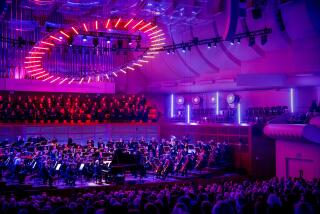For one among the giants
- Share via
There was a touch of melancholy in the air at Zipper Concert Hall on Tuesday night, for the founding father and kindly guiding light of Piano Spheres, Leonard Stein, was not in the house.
One of the last links to a now-distant era, when such giants as Stravinsky and Schoenberg lived and worked in Los Angeles, Stein died unexpectedly June 24 at the age of 87. Among other things, he was a baseball fan, and it seemed appropriate that the third game of a closely watched World Series was going on as his own innovative, intimate concert series opened its 11th season.
Fortunately, Stein appears to have left Piano Spheres in good shape, for plans are in place for this season and next, with guest pianists augmenting the resident lineup of Gloria Cheng, Vicki Ray, Mark Robson and Susan Svrcek.
Obviously, Cheng’s opening program was going to be her memorial to Stein, yet above all it was a statement that the feisty mission of Piano Spheres -- to present the new, the unusual and the overlooked -- was still in play.
Cheng started with a tiny, mordant masterwork that Stein often performed himself, Schoenberg’s Six Little Piano Pieces, Opus 19; the results were heavily legato, with a nice flash of temperament in the fourth piece. A different kind of humor crept into the mix with Conlon Nancarrow’s early Prelude and Blues, written before his epic series of player-piano studies yet infused with a similar jazzy, antic spirit.
Cheng tended to downplay the ragtime flair of the Prelude, but the Blues (not really a “blues” per se) received a slow, ambling, stone-faced treatment that heightened its humor.
Then Cheng unveiled something big and special: the first performance of Stephen Andrew Taylor’s “Seven Memorials,” a splendid sonic tour of natural phenomena all over the globe. The 32-minute piece is really a modern example of old-fashioned tone painting -- cascading ripples depicting a Yellowstone geyser, icy struck chords in the treble clef evoking an Antarctic glacier, a pedal-induced haze of ascending and descending figures suggesting the thin atmosphere of a Tibetan plateau etc.
Here, Cheng ravishingly exploited not only Taylor’s extraordinarily colorful writing but also the marvelous acoustics of Zipper Hall itself, especially during the resonant, thumping ostinatos of the prepared-piano episode depicting underwater lava flows.
There is also a composer named Stephen James Taylor, whose wanderings toward a volcanic peak -- or pique -- of rage in “Expressions” seemed like a succinct response to his near-namesake’s expansiveness. The fourth movement from Harrison Birtwistle’s “Harrison’s Clocks,” which bears a dedication to Stein, was a formless series of flourishes trailing off into nothing.
At Stein’s request, Cheng also presented the West Coast premiere of George Benjamin’s “Shadowlines” (it was scheduled for a recital he was forced to cancel last season). The work features tumbling dissonances in a legato cloud and a slow movement that gradually pulls itself together, but nothing as gripping as Benjamin’s orchestral music.
Cheng topped off the evening with a melting performance of the slow movement from Ravel’s Sonatine. It was the most touching Stein memorial of all.
More to Read
The biggest entertainment stories
Get our big stories about Hollywood, film, television, music, arts, culture and more right in your inbox as soon as they publish.
You may occasionally receive promotional content from the Los Angeles Times.










